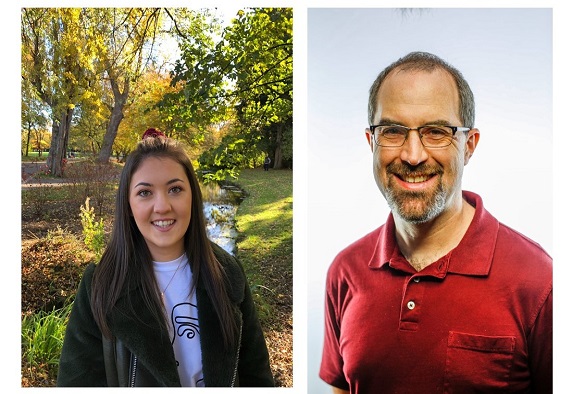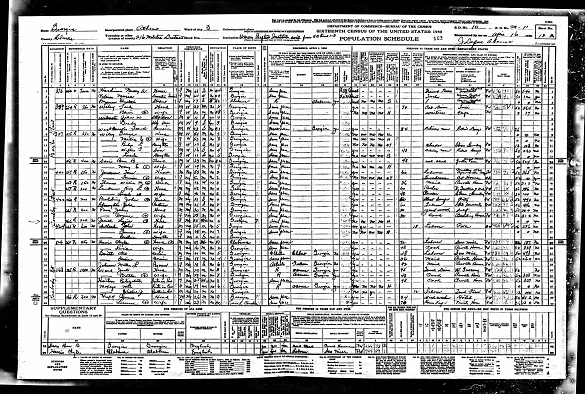
Hope Bleasdale and Dr Jerry Shannon
Hope Bleasdale, a PhD student with the Geographic Data Science Lab in the University’s School of Environmental Sciences was due to go to University of Georgia Athens (UGA) for a Doctoral student exchange programme for one week hosted by the UGA academic, Dr Jerry Shannon.
However, due to the current COVID-19 pandemic, Hope’s fellowship trip had to be cancelled. Despite this, Hope and Dr Shannon were able to complete the project they planned to work on virtually using different platforms and below they share their thoughts on how they found the experience:
1.What were you planning to do at UGA and what were your immediate thoughts when it was cancelled?
Hope: I was planning to visit UGA in March where I would get involved in Dr Shannon’s Community GIS class, working on a project surrounding the Linnentown neighbourhood of Athens. Linnentown was an African American neighbourhood that was removed as part of a state-led ‘urban renewal’ project in the mid-1960s to make way for UGA student housing.
The overarching aim of the Community GIS class work had been to shine a light on the history of Linnentown and to recover the story of this neighbourhood. I was planning to join in on the class activities, to meet some of the Linnentown community and other stakeholders involved in the project. It was really disappointing when the trip had to be cancelled. I felt quite deflated and was worried that all the hard work we had put in preparing for the trip would go to waste.
Dr Shannon: The original plan was that Hope would assist with ongoing research my class was doing on the Linnentown neighbourhood. The goal was to provide better insight into what this community was like prior to the university redevelopment.
The health situation here in Georgia escalated pretty quickly. We had talked a week before Hope was scheduled to fly and still thought the trip might happen but unfortunately it didn’t.
2.What was proposed as an alternative to the visit / what were your expectations?
Hope: I had already helped out the Community GIS class with some digitisation of the 1940 Census data for the area of Linnentown, and was kept up to date with the project on a weekly basis by Dr. Shannon so we felt it would be a shame to let this go to waste. Therefore, we decided to go ahead virtually with some of the things we had planned.
I did some analysis on the 1940 census data, showed Dr. Shannon my analysis first over a Zoom meeting and he really helped out with some data manipulation techniques that I could use. After this, I then presented my findings to the class and we had a discussion. Finally, I compiled together a short notebook of my analysis for Dr Shannon’s class.
I didn’t really have any expectations once the trip was cancelled, so I was glad that our preparation wasn’t wasted, and I managed to complete a lot of the work virtually. Also, the discussion with the class was really great and it was nice to hear a little bit about them too, even if we couldn’t meet in person. Overall I was just really pleased that we managed to get something beneficial out of the situation.
Image: 1940 census document

3. How did you manage to access the data you needed to carry out the project? If you used a different means please state.
Hope: Dr Shannon shared all of the project files and data through google drive. We had weekly zoom video meetings to talk about the project and could share our screens.
4.Based on your experience, to what extent do you feel that online learning can give you an international experience without even getting on a plane?
Hope: I feel like the virtual fellowship has actually been really beneficial for me even though I didn’t get to be there in person. It has developed my confidence in presenting and delivering presentations online; Dr. Shannon’s mentorship has definitely improved my R programming skills and I have learnt a lot of data manipulation techniques that I will continue to use throughout my own PhD course; and it has developed my time management skills – having to adapt to video meetings with a five-hour time difference!
5.Do you still think travelling overseas is important? What do you think travel gives which you can’t get online?
Hope: I think a virtual fellowship cannot be compared to the actual experience of a fellowship. As I have said, the online experience has been really beneficial, however I do believe I have only managed to do a small amount of what we actually had planned for the fellowship.
I would have been able to get involved in much more of the project had the trip gone ahead for example meeting some residents from Linnentown which would have been invaluable and would have really given a more tangible feel to the project.
I was hoping to hear a lot more from the students of the Community GIS class, many of whom are studying similar things as me. Also, the Community GIS students were going to present their work on the Linnentown project which would have been great to see. Alongside the Linnentown project,
I had also organised to meet up with some academics at UGA whose research interests align with mine. It would have been great to meet these and get to chat about their research in person, and unfortunately that is not able to be recreated online.
Dr Shannon: For a project like ours that’s so place focused, there’s really no substitute for being here. I also think that things like academic culture are hard to share via just a Zoom video. There are all sorts of other meetings that Hope hasn’t been able to do–meeting with students and other faculty here, and I’m sure that feels like a loss on her end. And it is! But I’m glad that we were still able to make this project work in a more limited way.
Please get in touch if you have had to move your study abroad experience online.
To learn more about our partnership with UGA visit: https://www.liverpool.ac.uk/intranet/global-university/globalpartnershipsandnetworks/northamerica/